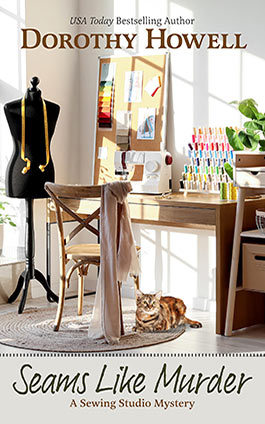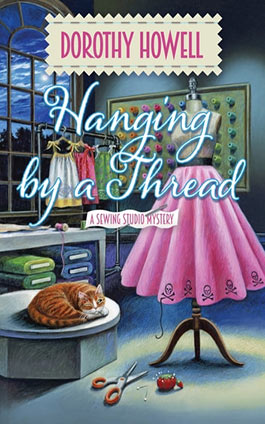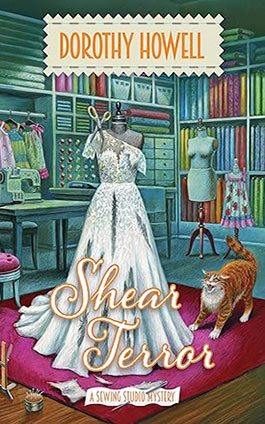Seams Like Murder, A Sewing Studio Mystery
Abbey Chandler needs a fresh start and an escape from her big-city job, so quaint, quiet Hideaway Grove, where she spent her childhood summers, seems like the perfect choice.
She barely arrives when the town is stunned by the murder of the spinster librarian. The librarian? Abbey left the chaotic, dangerous city for this?
When Abbey falls under suspicion and her car is seized, she occupies herself by setting up a sewing studio in the back of her aunt’s bakery, and attempts to make pillowcase dresses for charity.
But with the sheriff making little progress in the case, Abbey realizes she must investigate the murder herself. As she stitches clues together, a pattern develops and the truth begins to unspool. She’s got a notion about who’s guilty.
The Sewing Studio Series in order:
“Abbey? Abbey Chandler? Is that really you?”
The woman who’d stopped in front of me, mouth open, eyes bulging, shouting my name, had recognized me. Darn it. My escape into anonymity wasn’t off to such a hot start.
“I can’t believe it’s you!”
And I couldn’t believe I’d been recognized so quickly—my first hour back in Hideaway Grove—by, of all people, Brooke something-or-other, whom I couldn’t really place but who left me with the feeling that I’d never liked her.
We were standing on Main Street on a warm spring morning amid storefronts painted inviting creamy pastels and festooned with flowering plants. Young moms watched their kids play in the village green, and older folks ambled toward early-bird lunch specials. A handful of tourists strolled along the sidewalk taking in the specialty shops, antique stores, and art galleries the town was known for.
“You’re back!” Brooke exclaimed.
Brooke was a year or so older than me—I’m 24—with a carefully styled blonde ponytail, full-on makeup, dressed in a yoga togs. I was a little taller, with dark hair that I hadn’t combed since maybe sometime late yesterday, the remains of the makeup my tears hadn’t washed off, and I wore jeans and a T-shirt I’d pulled out of my dirty laundry hamper shortly before sunrise.
“So ...” Brooke’s gaze flicked from my head to my toes, and she stretched her smile wider until it froze in place. “What are you doing here?”
I was hiding out. Not because I was the star witness in a high profile government investigation, protected by federal marshals. I wasn’t on the run from a drug cartel. I hadn’t embezzled millions from my employer, or murdered someone. I was hiding out from … well, everything.
So I certainly couldn’t talk about it—especially to Brooke, whose last name I’d probably remember eventually, along with the reason I’d never liked her.
“I’m visiting my aunt,” I said.
“Oh, yes, of course! Your Aunt Sarah. Sarah’s Sweets.”
Brooke nodded down the street to the bakery my aunt owned. Sarah’s Sweets turned out delicious cookies, cakes, cupcakes, and other goodies, all beautifully decorated. Her business had been a mainstay in Hideaway Grove for decades.
“You used to live with her during the summers,” Brooke said, “when your parents were off seeing the world and didn’t want you with them.”
Now I remembered why I didn’t like Brooke.
My parents were tenured university professors whose idea of a fun summer was digging through ruins in a remote jungle, or investigating obscure museum archives in settlements accessible only by camel train. They didn’t want me with them—any more than I wanted to be there.
“Well, good seeing you,” I announced. It wasn’t, of course, but this was an easy out for me. I walked away.
“We’ll have to get together!” Brooke called.
I pretended I didn’t hear her.
I paused outside of Sarah’s Sweets. The building was painted buttery yellow. Beside the entrance were low flower beds bursting with color. The bell over the door chimed as I walked inside and the delicious scents hit me, bringing on a wave of emotion I hadn’t expected. Memories swamped me, causing tears to pop into my eyes. I blinked them away and saw my aunt Sarah standing behind the glass display case, sliding a tray of fresh baked brownies into place alongside rows of sugar cookies.
I hadn’t seen her in years, but she matched up perfectly with my memories of the summers I’d spent in Hideaway Grove. Tall, like most of our family, her hair still dark—she always said she’d never go gray—trim and fit, looking far from the “senior” label she’d likely acquire next fall when she turned sixty. She wore jeans, an on-trend shirt, and shoes I’d love to own, all topped with a crisp white apron.
“Welcome! I’ll be right with—” She looked up and saw me. “Abbey!”
Sarah dashed around the display case, her arms spread wide, and captured me in a firm hug. “You made it. I’m so glad you’re here.”
She pulled me tight against her. Wonderful memories bloomed in my head once more.
Sarah, even though she’d never had children of her own, hugged me like my mother never did, nurtured me like my mother never did, loved me like my mother never did. Sarah was my anchor. I hadn’t realized how adrift I’d been without her until a few days ago.
She stepped back and rested her hands on my shoulders, her welcoming smile still glowing.
“You look beautiful,” she said.
“I look awful,” I said, and blinked away tears again.
“You look beautiful to me,” she declared.
I couldn’t help smiling.
“You’ve got to have one of these brownies. They’re fresh from the oven. I’ll get you some milk,” Sarah said, and rounded the display case again. “Come on back. Sit down and we’ll catch up.”
I followed her, taking in the shop. It was painted mint green, with accents of pale pink and yellow. Four tiny white tables with yellow padded chairs sat by the front windows. Shelves held specialty cakes for weddings, birthdays, anniversaries, all beautifully handcrafted. Another shelf had a rainbow of sprinkles in glass jars. There were charming gifts for sale--cookbooks, mugs, birthday candles, plates and napkins, cake stands, cookie cutters, and measuring spoons. A large, refrigerated case held orders for pick up; another featured cakes ready to be personalized for walk-in customers.
I gestured to the double pocket doors across the room, closed tight. On the other side of the doors was a large space that Sarah had used for storage. I used to play in there during my summer visits; the sunlight beaming through the windows had made the big, cluttered room seem warm and cozy.
“I thought you were opening this up for a dining area,” I said, remembering an email she’d sent me several months ago, and feeling bad that I hadn’t asked her about it since.
“It’s on hold,” Sarah said, placing a brownie on a plate.
“For how long?”
“Indefinitely. Gretchen—you remember her, she worked in the needlepoint shop before it closed—she wanted to use part of the space for a gift shop and souvenir sales. You know how tourists love shopping, especially for Hideaway Grove’s owls.”
Aside from the specialty shops, art galleries, and antique stores, we were known for owls. The town’s founder had been a bird watcher and was particularly fond of owls, so likenesses of them had been incorporated into light posts, park benches, even a jungle gym in the village green.
“Gretchen planned to sell gift items, and I intended to serve goodies to our customers,” Sarah went on. “I knew I could increase business and expand my menu a bit if folks had a comfortable place to sit, visit a little, and eat. And, of course, tourists would flock to the gifts and souvenirs.”
“Sounds like you two would make a great team,” I said, joining her behind the counter and sliding onto the tall wooden stool I’d sat on as a child.
“We had it all planned out. We even got started, cleaning up the space, doing some repairs.” Sarah poured a glass of milk. “Gretchen was going to make new curtains for the windows—no small task, with windows that big, but she’s a whiz with that expensive sewing machine of hers.”
Sarah passed me the brownie and I bit into it. Still warm from the oven, the delicious flavor bloomed in my mouth. I nearly moaned aloud.
“Then her daughter over in Fresno was diagnosed with cancer, and her so young and with those three children,” Sarah said and placed the frosty glass of milk on the counter beside me. “Gretchen had to move there to help out.”
My eyes started to water from the chocolate melting in my mouth, but I managed to ask, “How’s her daughter?”
“Receiving treatment, but it’s a difficult thing. We’re all praying and hoping for the best.”
“You didn’t want to continue the renovations without her?” I asked.
“Bad timing,” Sarah said. “The air conditioning unit went out and had to be replaced, then the roof needed major repairs.”
I understood Sarah’s caution. She hadn’t kept her business thriving all these years by being reckless with her finances.
I finished the brownie, licked my fingers, and downed the milk, suddenly feeling like I was a child again—which was kind of nice.
Sarah looked at me with a familiar expression on her face, the one that assured me she was listening, wouldn’t be mad no matter what I said, and would help me figure out any situation, if I wanted her to.
“You want to tell me what’s going on?” she asked softly.
I hardly knew where to start but I finally said, “Everything is a mess. A complete mess. Everything.”
“Everything?”
I slid off the stool and circled the big butcher block work island in the center of the kitchen; surrounding it were ovens, appliances, cupboards, and a walk-in fridge.
“I know what you’re thinking,” I said, and rinsed my glass and plate at the sink. “Everything couldn’t possibly be wrong. Not everything. But it is. There was so much happening, so much chaos, so much—everything.”
“You’ve lived in Los Angeles for a while now, six months, isn’t it? Your emails sounded like you were doing well,” Sarah said. “What changed?”
I put my cup and plate in the dishwasher and shook my head. “It was—everything, somehow. All I could think was that I had to get away, come here, where things are quiet, and slower, and easier.”
I’d made the decision to leave, to come to Sarah’s, while I’d been walking the floor last night, unable to sleep, trying to determine what, exactly, my life had turned into and where, exactly, it had all gone so wrong. I’d finally realized I was never going to figure it out, not there, not in the middle of everything, so I’d packed a bag and headed north. Thankfully, Sarah had answered my phone call and told me to keep driving, she’d love to have me visit.
“You did the right thing coming here,” Sarah said. “Sounds as if what you need is some peace and quiet.”
I sighed. “That sounds delightful.”
“But what about your job?” Sarah asked. “Were they okay giving you some time off?”
I glanced away. “It wasn’t a problem.”
“You probably want to go to the house and get some rest,” she said.
Sarah’s house was just around the corner on Hummingbird Lane. I’d left my car there and walked over.
“I could use a shower,” I said.
“Go on. The extra key is under the—
“—yellow flower pot beside the back door,” I said.
“Make yourself at home. We’ll figure out how to handle things when I get there. Sound good?”
It sounded better than good. It sounded perfect.
“Maybe get a nap,” Sarah said, as she headed for the trash bins beside the back door.
“Taking out the trash used to be my job,” I remembered.
We each grabbed a plastic bag out of the bins—even the trash smelled delicious—and headed for the rear exit that led to the alley out back. Just as I pushed the door open, I heard a loud noise and a woman scream.
Sarah and I shared a troubled glance, and I flung the door open.
The alley was narrow, barely wide enough to accommodate the Dumpsters and the delivery trucks that served the businesses that faced Main Street. Something flashed atop the high retaining wall that separated the alley from the neighborhood behind it, then disappeared.
“My goodness, what is going on?” Sarah exclaimed, pointing.
A woman stood farther down the alley, off to our right, screaming. In one hand she held her purse, in the other was a tote bag, and she was flinging them in the air and jumping around. I figured her for about Sarah’s age, short dark hair, dressed in a coral pantsuit.
“That’s Earlene,” Sarah said. “What’s gotten into her now?”
We dropped the trash bags and headed toward her, then realized she was pointing at something lying near the building.
“It hit her!” Earlene screamed. “That car! It hit her!”
Fear swept through me as I went closer and realized that a woman was lying on the ground. She wore a cardigan twin set, elastic waist pants, and flats. Her handbag was a few yards away, open, its contents strewn across the alley. Nearby was her cell phone. Her body lay still, her head smashed against the side of the building, the rest of her twisted at unnatural angles. Blood flowed everywhere.
“It didn’t stop! It kept going!” Earlene yelled, pointing to where the alley turned between the buildings and intersected with Main Street.
Sarah placed a hand on my arm, then leaned forward and gasped.
“Oh my goodness, that’s Iris, Iris Duncan,” she whispered. “I’ll call nine-one-one, get some help here.”
I didn’t stop her, of course, but from the look of the poor woman l knew there was nothing paramedics could do to help.
“It kept going. That car, it didn’t stop.” Earlene crept closer, wringing her hands, juggling her purse and tote bag. “It hit that woman and kept going.”
“A hit-and run?” I asked.
“That’s Iris Duncan,” Sarah said, punching numbers on her cell phone.
Earlene gasped. “Iris? It can’t be Iris!”
“Who’s Iris?” I asked.
“Hideaway Grove’s new librarian,” Sarah told me.
I stared at them both. I’d come here for the peace and quiet, the tranquility of a small town—only to find somebody had been callously run down? And that somebody was the librarian? The librarian?
I left Los Angeles for this?











